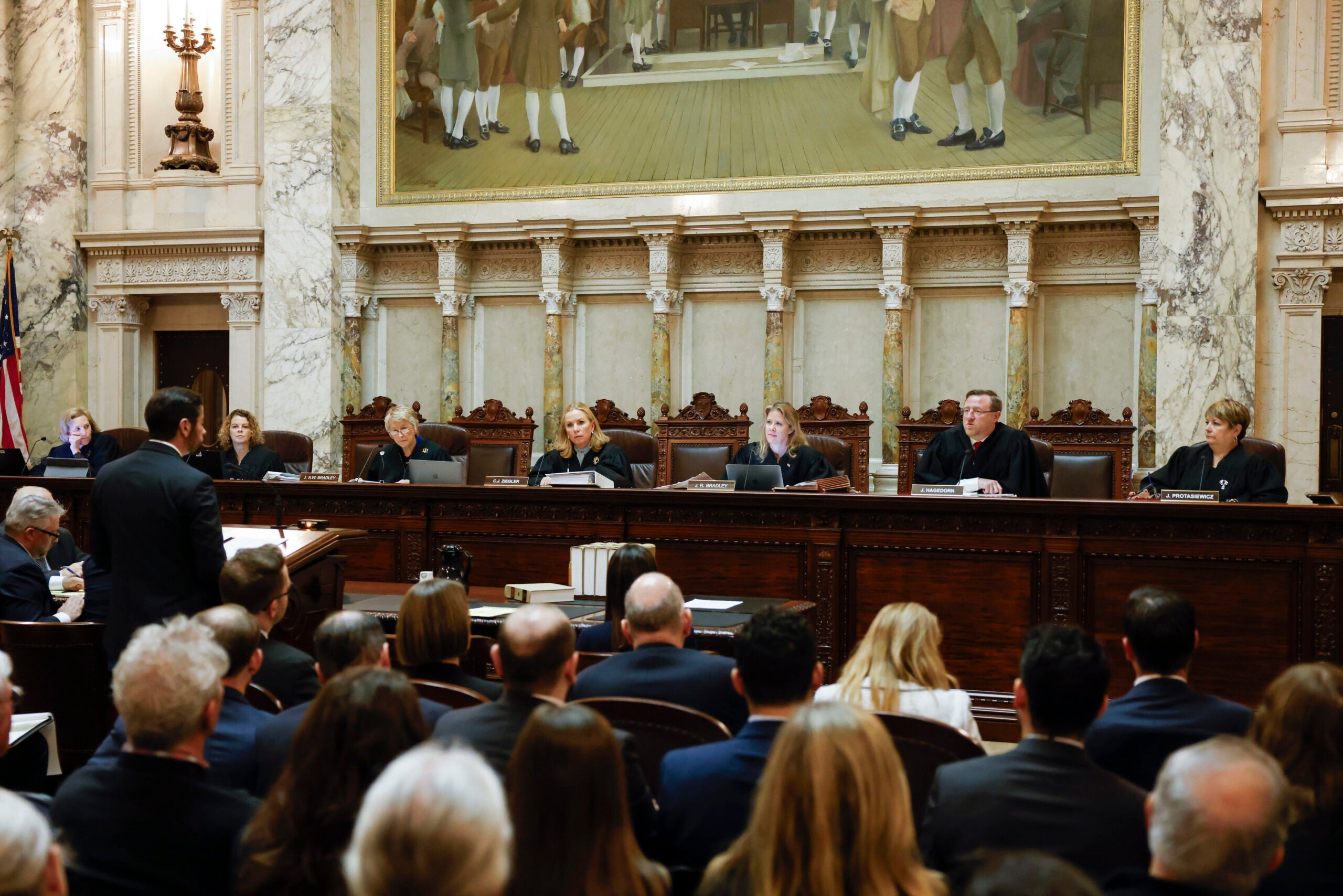Wisconsin Republicans want to subpoena two redistricting consultants who last week told the state Supreme Court that GOP legislative maps submitted as part of an ongoing redistricting case are partisan gerrymanders.
If the court doesn’t allow that step, attorneys representing GOP lawmakers and voters told justices that their expert report should be tossed out.
University of California, Irvine political scientist Bernard Grofman and Carnegie Mellon University political scientist Jonathan Cervas were hired by the court to review six voting map proposals submitted by parties to the redistricting lawsuit, including the GOP-controlled state Legislature.
News with a little more humanity
WPR’s “Wisconsin Today” newsletter keeps you connected to the state you love without feeling overwhelmed. No paywall. No agenda. No corporate filter.
On Feb. 1, they published a report that called map two map proposals — one from the Legislature and another from the conservative Wisconsin Institute for Law and Liberty, or WILL — “partisan gerrymanders.” Grofman and Cervas said that from a social science perspective, the Legislature’s maps do “not deserve further consideration.”
On Thursday, attorneys for both Republican lawmakers and WILL filed a motion calling on the Supreme Court to let them subpoena the consultants, claiming their role had been unclear before their report was filed.
“The role the Consultants are playing is clearer now that the parties have seen their report. It is unmistakably an expert report,” the motion said.
Republicans claim that “as Court-appointed experts,” cross-examination is allowed under Wisconsin law. They objected to the consultants’ use of the “social science perspective” in the report and that “it does not appear the Court intended them to be referees.” The term “referee” carries legal significance in Wisconsin.
Should the court reject the subpoena motion, Republicans called on justices to strike the report.
Republican lawmakers, WILL and other parties to the redistricting case also filed response briefs to the consultants’ report Thursday.
WILL blasted Grofman and Cervas for calling their maps a “stealth gerrymander,” while at the same time, stating those maps “score very well on traditional good government criteria.”
The WILL response said that because the court’s liberal majority said it would not consider partisan gerrymandering claims when it agreed to take the redistricting lawsuit, adopting the consultant’s “‘partisan gerrymandering’ rationale” for rejecting the WILL maps would be “the ultimate bait-and-switch” and an “egregious due process violation.”
The response filed by the Legislature all but promised an appeal to the U.S. Supreme Court if the Wisconsin Supreme Court’s liberal majority denies lawmakers’ ability to cross-examine Grofman and Cervas. Their brief said the state Supreme Court promised “that it would not wade into the political thicket of ‘partisan gerrymandering.’”
When the court’s liberal majority declared current GOP-drawn maps unconstitutional in December, it did so because dozens of districts were noncontiguous, which means parts of them were disconnected and located in other districts.
The Legislature’s response accused Grofman and Cervas of giving the court “a ‘partisan gerrymandering report,’ not a contiguity report.”
“If the Court wished to invite further appellate review, there would be no better way than to stay the course, deny the parties discovery and a hearing, adopt the Consultants’ report, and move millions of Wisconsinites because of ‘social science’ and supposed ‘gerrymandering’ on the eve of 2024 election deadlines,” said attorneys for the Legislature.
Court documents filed Thursday by Democrats in the redistricting lawsuit praised Grofman and Cervas.
A response filed by attorneys for Gov. Tony Evers claimed the report from “the neutral consultants reaffirms the clear divide in this case. “
“It is between proposals like the Governor’s, which comply with constitutional and traditional districting criteria, reduce partisan bias, and promote responsiveness to the vote,” wrote Evers’ attorneys, who said Republican alternatives are “extremely biased and promote entrenchment” of GOP majorities in the Legislature.
A response by the Democratic voters who filed the lawsuit, who are represented by the liberal firm Law Forward, said their proposed map would be the strongest on most metrics, and best ensure that the party who wins the most votes will win the most seats in the Legislature.
“Majority rule, of course, is the foundation of American government,” they wrote.
Wisconsin Public Radio, © Copyright 2025, Board of Regents of the University of Wisconsin System and Wisconsin Educational Communications Board.




